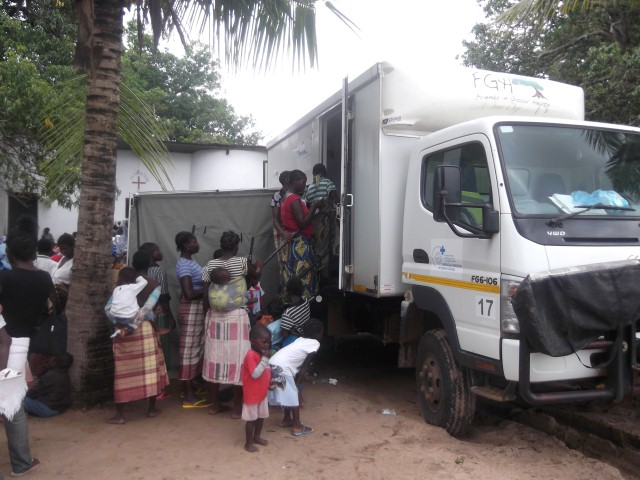
Mozambique
Q4/2012: Mobile Clinic providing HIV/AIDS care, treatment and counseling
March 22, 2013
Tito Jequicene, MD
Project Background:
RMF’s Mobile Clinic in Mozambique is a new model of health care provision for our organization, conceptualized to reach remote and rural communities with no prior access to health care. Since its inception in 2008 our Mobile Clinic has been hugely successful and remains the only mobile clinic in all of Mozambique. The clinic, a collaboration between RMF, Vanderbilt University’s Friends in Global Health and Medical Mission International, is currently deployed in one of the most populous provinces of Mozambique, Zambézia Province, located in the central coastal region with a population of almost 4 million.

Project Goal:
- To improve the quality of life and provide access to health services, particularly access to maternal-child healthcare and anti-retroviral therapy (ART) for people living with HIV and AIDS, Tuberculosis and other diseases.
- To provide access to healthcare in remote areas of Zambézia Province, Mozambique
- To reinforce the expansion of HIV care and treatment services initiated by the Zambézia Provincial Health Directorate (DPS), by providing temporary reinforcement in terms of staff, training, and space for peripheral health units initiating implementation of ART until such time as the DPS can organize the infrastructure and resources necessary for these sites to function independently.
Project Objectives:
To increase the number of people with access to health services as well as the number of patients enrolled in HIV care and treatment services in the targeted areas.
Summary of RMF/MMI-sponsored activities carried out during the reporting period under each project objective:
In the Fourth Quarter of 2012 the Mobile Clinic began full implementation of the strategy presented in January 2012, visiting the towns of Malei and Mexixine bi-weekly. The main activities of the Mobile Clinic, which are also supported by funds from the CDC/PEPFAR, include provision of:
- Primary health care to the populations of Malei and Mexixine;
- HIV diagnostic, care and treatment services including integrated TB/HIV services for co-infected patients;
- Antenatal health services and PMTCT to pregnant women;
- Health care services and early diagnosis of HIV in infants born to HIV positive women;
- Diagnostic services, treatment and care of TB;
- Participation in Health Fairs in the localities of Malei and Mexixine for International World AIDS Day, December 1.
Number served/number of direct project beneficiaries:
1,369 people benefited directly from activities implemented by the Mobile Clinic during this reporting period.
Success story(s) highlighting project impact:
MORE WOMEN AND CHILDREN benefiting from PMTCT-related prophylaxis

Mobile Clinic brings glimmer of hope to pregnant women and children in the town of Mexixine
Olympia Julius Fortunato, an SMI nurse working for more than four years in Mexixine Health Center, has been implementing the center’s HIV Prevention of Mother to Child Transmission of HIV (PMTCT) program for the past year. Since the beginning of the PMTCT activities, Nurse Fortunato felt frustrated by not being able to implement certain aspects of the training she received for the program. One of the major constraints for her was the inability to properly care for HIV+ women, HIV+ expectant mothers and children exposed to HIV due to frequent disruptions of HIV testing and antiretroviral medication used for prophylaxis.
With the arrival of the Mobile Clinic, the facility now has bi-weekly support from an SMI Nurse Mentor. According to Nurse Fortunato, “the technical support provided by the SMI Nurse Mentor has been rewarding because it allows us to follow individual cases with greater safety."
In addition to this assistance in patient care, the new SMI Nurse Mentor has given technical support on the use of MOH protocols, handling registration of new instruments and supply management for test kits and ARVs. Through the mentorship, Nurse Fortunato was able to gain skills in calculating gestational age, which is a major step toward the start of prophylaxis administration. Due to the improved management of tests, many women have benefited from HIV counseling and testing, and thus far approximately 300 pregnant women received ARV prophylaxis through Mobile Clinic support. The Mobile Clinic now provides antiretroviral treatment locally, something that was impossible before its arrival. Previously, patients had to be referred to a health facility in the village center, nearly 30 km away."I feel that something has changed in the lives of women and children in this locality," Nurse Fortunato shared.
Other important aspects that have been implemented with the introduction of additional services of the Mobile Clinic include additional routine tests, such as sampling of CD4, blood count, biochemistry, the use of a hemoglobinometer for the measurement of hemoglobin and PCR and its transport to the reference laboratory. A large number of women and children seek testing services and ART follow-up during the weeks when the Mobile Clinic is present, and that number continues to increase as information spreads in the community. Mothers and children that previously ventured to the main Health Center for ART treatment and subsequently abandoned treatment due to distance have since visited the Mexixine Health Facility seeking these services.
Whenever Nurse Fortunato has the opportunity to participate in meetings with traditional authorities, political activists and health, she takes the opportunity to talk about the Mobile Clinic activities to disseminate the message to the community. "I'm glad to know that the ART service provision will be a permanent part of this facility."